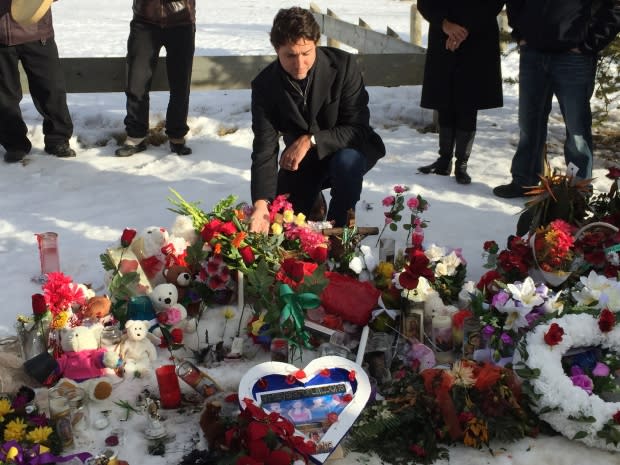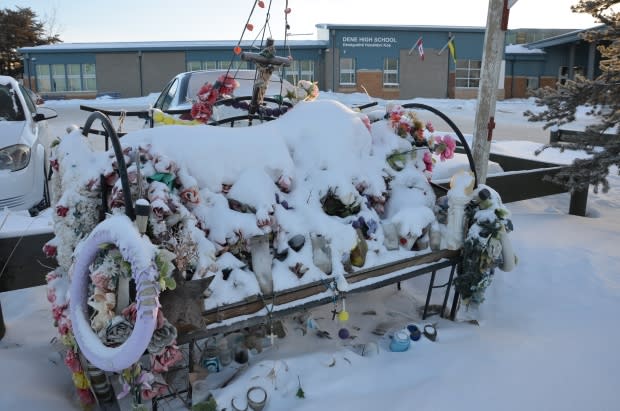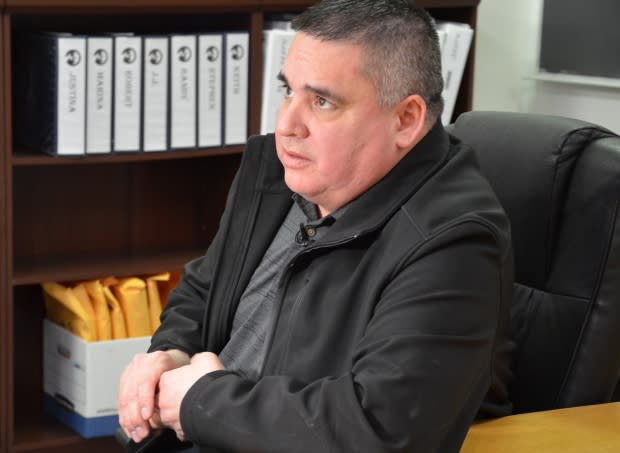La Loche still needs 'a lot of work' 3 years after school shooting
The walls at the Dene High School in La Loche, Sask., no longer have bullet holes.
They were patched up during the $4.45-million renovation paid for by Saskatchewan's provincial government. There's also a new entrance — complete with security desk — and a new administrative office with large windows so staff can see what's going on outside.
Inside, some of the classrooms and the library got new doors. Martha Morin, the newly hired school wellness co-ordinator, said the school had asked for windowless doors, but that's not what they got. Last week, on the day the renovations were unveiled, those doors had cardboard blocking their windows.
"He shot people through the windows, mostly," she said.
"He" is the young man who, on Jan. 22, 2016, a few weeks before his 18th birthday, killed two teens with a shotgun in a home in La Loche, then went to the high school, killed two more people and injured seven others.
La Loche, a remote village in northern Saskatchewan, became the focus of international attention. Federal and provincial politicians governments flew in for memorial services, offering words of encouragement but few concrete commitments.
"I can't speak for past governments, but I do know that governments of all stripes have not done enough to support and invest in northern and remote communities," Prime Minister Justin Trudeau said during a trip to the village shortly after the shooting.

"There need be, and can be, more support from governments," then-premier Brad Wall said during the same visit.
Robert St. Pierre, La Loche's mayor, said that while there has been progress, there is still much more to be done.
"It's been three years," said St. Pierre, who assumed his position as mayor soon after the shooting.
"We've mentioned lack of housing, lack of employment, lack of services in the community. We're still there."
'Trust building'
There have been some improvements in the community.
In addition to the school renovations, the provincial government paid for a $480,000 upgrade to the local health centre. The emergency room is better equipped to deal with mental health crises and can refer patients to a mental health and addictions worker or a psychiatric nurse.

There are now two local mental health professionals that speak Dene, the First Nations language spoken by much of the town's population of about 2,800. They were brought in as part the Keewatin Yatthé Health Region's efforts to provide culturally appropriate services.
About five per cent of the community accesses mental health support each month.
"Most of our clients are seen not through psychiatrists but through our mental health and addictions team right away, or within a few days," said Amrinderbir Singh, director of primary health services in La Loche.
Dr. Sara Dungavell, a psychiatrist from Saskatoon, travels to the village once a month to host a remote clinic for half a day.
Singh said Dungavell's visits are consistently fully booked, sending some residents to communities 500 and 600 kilometres away for services.
"There is a wait list there and we have to refer some patients to North Battleford, as well. It's not entirely meeting our demand," he said.

St. Pierre said he is pleased with these increases in support, but still sees the need for more services in his community that is still reeling from the tragedy.
"In the community, it's touch and go. There's a lot of work that needs to happen, and trust building."
In the community, it's touch and go. There's a lot of work that needs to happen, and trust building. - Robert St. Pierre, mayor of La Loche
He says the community still doesn't know about all the services available, though the health region is working on it.
"Knowing that it's there and knowing that it's consistent will gain people's trust," he said.
St. Pierre said it's worrisome that locals only have access to a psychiatrist in-person once a month.
"If nobody's there for you, you kind of give up," he said.
'They don't care about us'
Charlene Klyne, who was a substitute teacher at Dene High School and seriously injured in the shooting, says the system has failed her.
She lives in Saskatoon now, and says she had no desire to go back to La Loche for the school's grand reopening.
"What's so grand about reopening a school where two people were killed and seven people were injured? There's nothing grand about it," Klyne said.

Of the seven people who suffered injuries at the hands of the shooter, only one attended the ceremony.
"It's just not time yet," said Northern Lights School Division director of education Jason Young.
He said the survivors are "in our minds and hearts" and that invitations to the event went out to "some."
Klyne,who is in her late 50s, can't see out of one eye; the other gives her only a blurry view of the world. She still has shotgun pellets in her body.
She she has not received enough money to cover the health care she requires.
She received $50,000 from insurance and gets $300 bi-weekly in worker's compensation, payments that will end when she turns 65. She is fundraising to prepare herself for that time.
Community plan
The Saskatchewan government says it worked with La Loche after the shooting to develop an Official Community Plan.
It includes "a comprehensive policy document designed to guide the physical, environmental, economic, social and cultural development of the northern village," according to a statement from the government of Saskatchewan.
"This municipal bylaw will provide for local decision-making consistent with the principles and objectives for local growth and development."
It is unclear exactly what kind of action is attached to the community planning.
Wall told the community in 2016 that the province's health and finance ministers would be speaking to the federal government about Indigenous health and northern mental health issues.
A sub-committee on health was established, and now, the Saskatchewan Health Authority meets with St. Pierre and council regularly.
Housing needed
One of the challenges the village faces is a lack of housing, according to the mayor.
St. Pierre said that without more quality places to live, the professionals the village needs simply will not show up.

Dene High School began the fall semester without enough teachers. The health sector is similarly affected by high staff turnover.
There is some new construction going on, but St. Pierre said it isn't enough.
St. Pierre said it's time Saskatchewan took meaningful notice of La Loche. He said one of the best ways to improve life for its residents is for people to "take a chance" on the community and invest in businesses up north.
"We're the largest community in the north and we're still struggling with those components in our community," said St. Pierre.
Moving on
Students at the high school have worked hard to move on.
The school's gym now has a mural painted by students as a testament to their strength. Others have written poems commemorating the victims of the shooting.
Many students now wear identical black winter coats. On the back, near the bottom seam, they all bear an identical label: "Dene Strong."
They showed strength beyond their years, even in the immediate aftermath of the tragedy.
One of the school's volleyball teams was scheduled to play a tournament a week after the shooting. A female volleyball player asked Principal Greg Hatch if they could still play.
He said no. She said, "I want to play." So they did.

